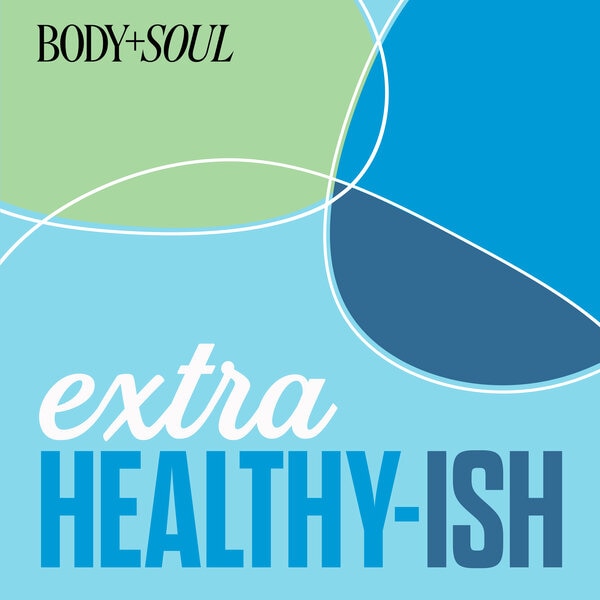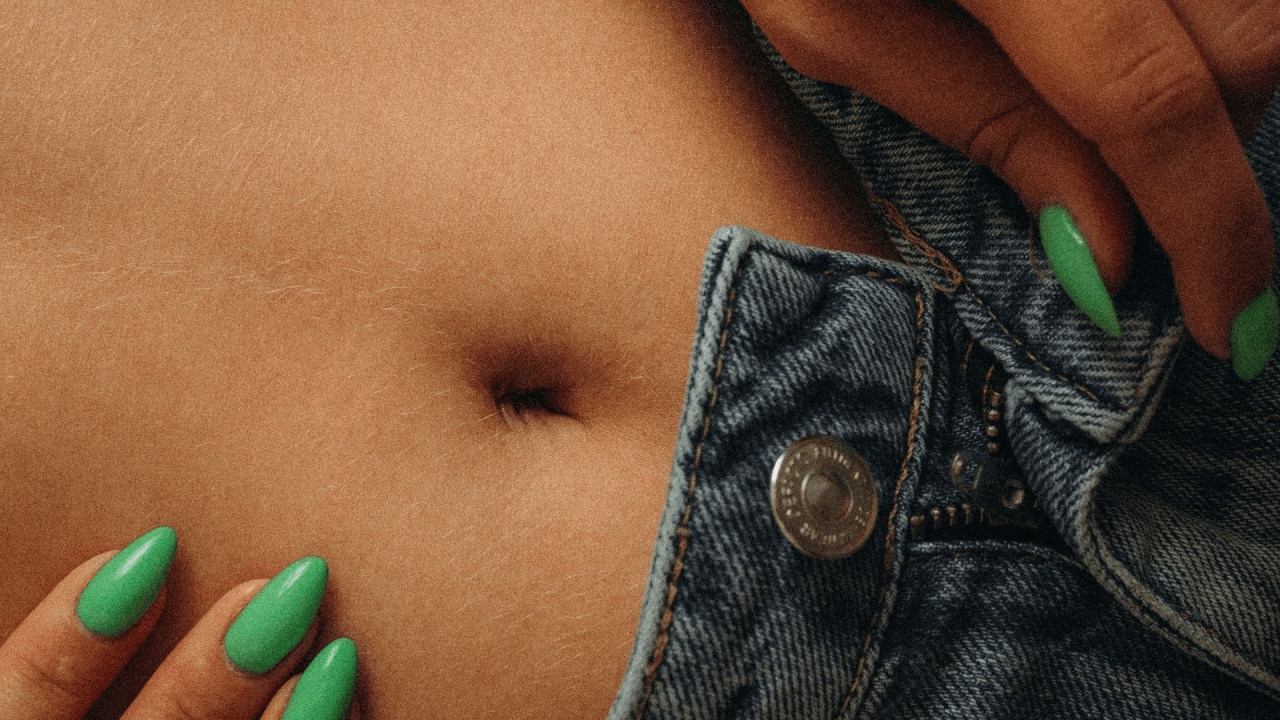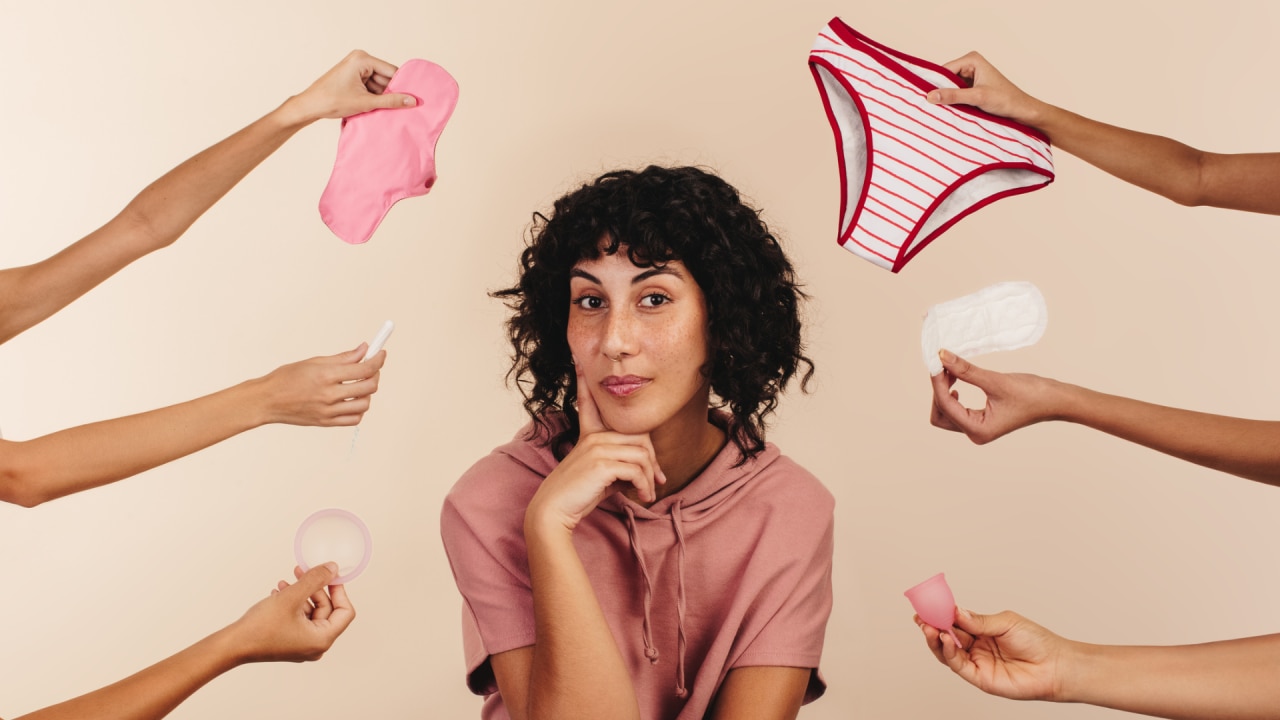On an auditorium stage in Perth, a woman dressed in red is standing in a spotlight and holding a microphone. A packed house sits captivated as she shares how to harness what she describes as “the greatest life hack of them all”. The online recording of this TEDx Talk now has close to 90,000 views – and that powerful hack she’s talking about is the menstrual cycle.
Lucy Peach is a folk singer, self-described “period preacher” and the author of Period Queen. A former sexual health educator and long-time champion of the power of female cycles, she remembers earlier performances of this show where her audience “wouldn’t leave the foyer afterwards because they just wanted to talk with strangers about their periods. I realised there’s a real hunger and readiness to have these kinds of conversations.”
Once upon a not-so-distant time, period talk often came with a side of hushed tones, euphemisms and apologies for sharing #TooMuchInformation. And while ‘Aunt Flo’ and ‘time of the month’ still pepper our vocab, there’s no denying a revolution is well and truly underway. In this new era, menstrual cycles are spoken about more frankly and openly, eroding period stigma is a top priority and how our bodies work each month is something to tune into rather than turn away from. Peach’s work is just one neon signpost on this groundbreaking new landscape.
Like what you see? Sign up to our bodyandsoul.com.au newsletter for more stories like this.
This year, Wimbledon relaxed its historic all-white dress code to let players wear dark undershorts in a bid to ease period anxiety. Locally, the AFL has ditched white shorts for women and girls playing the sport, while the Canterbury-Bankstown Bulldogs became the first NRL club to roll out a program that provides free period products for players, fans and staff. And who can forget the FIFA Women’s World Cup 2023, where the Matildas debuted a new Nike kit featuring leak-proof technology? Star forward, Mary Fowler, is among the big names calling for more dialogue about the impact of periods on athlete wellbeing and performance. Another is fitness entrepreneur, Kayla Itsines, who has shared her experience of endometriosis to raise awareness.
This new menstrual movement is making waves beyond the sporting arena, too. Leak-proof apparel brand, Modibodi, treated festival goers to a luxe pop-up bathroom at Splendour in the Grass recently. Meanwhile, the first Global Period Poverty Forum was held in Brisbane in 2022, bringing together researchers and voices in the fight for menstrual equity. And a group of the nation’s biggest unions is currently campaigning for menstrual leave to be introduced into workplace law.
Parallel to all of this is the booming period-care industry, which offers more product options than ever. Tired of tampons? Take your pick from period undies/tights/swimwear, menstrual cups, menstrual discs, organic pads, reusable pads… the list goes on. Want to harness your cycle for optimising your workouts and wellbeing? There’s a super-smart app or online platform for that, from NikeSync and FitrWoman to Femmi – an expert-led coaching and education portal that helps women train with their hormones and physiology in mind. By 2030, the global value of the period app market is tipped to increase by a whopping 20 per cent. So, with a once-taboo topic now front and centre, what does this mean for the future of your health and happiness? Hint: it’s pretty bloody exciting.
The power of the period
As for what’s driving this revolution, Peach points to the rise of social media. “The really exciting thing is people are less apologetic about their bodies and about themselves,” she says. “Some have endometriosis, some have no period pain, some want kids, some don’t, and all of it is valid. There’s so much that hasn’t been spoken about for so long, that we could be talking about this for another 500 years and still wouldn’t get bored of it.”
Dr Izzy Smith, an endocrinologist and medical expert at Femmi, believes the uptick in research around women’s sport is also to thank. “In the 1970s and ’80s, it was often thought that losing periods meant you were training ‘well’, because of this untrue belief that to be a good athlete you needed to be less like a female,” she explains. “But there’s been this massive cultural shift. We’ve realised women maintaining their hormones is actually really important for health and athletic performance. There’s greater understanding of the negative impacts of losing the menstrual cycle – it increases the risk of stress fractures and injuries, among other things – and we’re now exploring how we can optimise training and recovery by tuning into our physiology.”
Whatever the forces behind it, the impact of this seismic shift is set to be a game changer. Talking more about the menstrual cycle puts a brighter spotlight on health conditions like endometriosis, polycystic ovarian syndrome and adenomyosis, notes Smith, which could lead to advances in diagnosis and treatment. It may also prompt us to seek medical advice for red flags we might’ve missed or not felt comfortable raising before. “The more we speak openly about periods, the further we move away from shame and embarrassment,” says Modibodi’s chief marketing officer, Liana Lorenzato, who adds this is vital for keeping girls and women in exercise and sport. “We also need to address the stigma around menstruation to understand and fix the challenges people face around access to menstrual hygiene products.”
A report by Plan International Australia found almost six in 10 of us are finding it harder to afford period items at the moment. “If that stigma is removed – or even eased by talking through these issues – we as a society can move forward to help end period poverty,” says Lorenzato. Tapping into how your cycle can impact everything from mood to energy also encourages self-compassion, says Smith. Peach adds: “Everything that’s important to you will benefit from a connection to your body and cycle, whether it’s relationships, work or creative projects. It’s part of who we are. There’s also the benefit of daughters seeing their mums be open about this topic; of young people growing up understanding that it’s very normal to fluctuate throughout the month and those things can be harnessed.”
Playing cycle detective
Ready to start decoding and maximising what’s happening in your body? Thought so. But first, a biology recap. Your menstrual cycle tends to be described in four phases – menstruation (a period), follicular, ovulation and luteal – with changing levels of hormones including oestrogen and progesterone coming along for the ride. Smith caveats that it’s relatively early days in the science stakes and the research so far – on things like how the menstrual cycle impacts workout performance – is quite mixed.
“Puberty, pregnancy and menopause are different for everyone, so why wouldn’t menstrual cycles and the changing levels of hormones also impact individuals differently?” asks Smith. “That’s why I’m all about people tracking their cycle and knowing how it impacts them, rather than saying, ‘You should do this or that at a certain time of the month.’ Because that, to me, is not empowering and it’s not really that evidence-based, either.” Start by tracking your cycle with an app or by counting from your next period, then look out for trends and changes. “So, for example, towards the end of your cycle, you might get a bit constipated because progesterone increases and that slows down the gut,” says Smith. “Once you understand more, you can take into account how you might feel at different times of the month – energy levels, sleep, mood, how training feels, and so on.”
Peach, whose Believe Your Body online course includes personalised cycle coaching, suggests taking at least three months to notice patterns. “It can feel overwhelming to think, ‘I’m going to get across every part of my cycle at once,’ but there’s no rush. You’ve got plenty of cycles ahead and, with each one, you can explore and bring your attention to a different phase.”
Talking the talk
When it comes to supporting the wider movement, conversation is crucial. But, with 37 per cent of us only speaking about our periods if we have concerns, it sparks the question: how can we get comfier with menstrual chat? “If you’re talking about something to do with your cycle, try doing it without an apology,” tips Peach. “Use regular words and a normal voice. Because, when you do that, you make space for the other person to be normal about it, too.”
Another area this conversation is especially vital is the workplace. A survey of around 1000 union members – done as part of the menstrual leave campaign – revealed the majority suffer from painful periods, but 74 per cent of those wouldn’t feel comfortable asking their manager about leave or flexible working to cope with symptoms. Modibodi is one of a growing number of companies changing the tide; the brand introduced paid menstrual, menopause and miscarriage leave in 2021. “Feedback from employees has been extremely positive,” says Lorenzato. “Staff have revealed this leave has helped them feel less guilty or ashamed and more comfortable, because they can actually rest and recover without worrying about work or what colleagues may think.”
If you’re in a position of influence at work, consider bringing this discussion to the table. “The introduction of a policy like this will help break the stigma around women’s health topics,” continues Lorenzato. This could open the floor for increased dialogue around everything from perimenopause to miscarriage and fertility – and it’s important that non-menstruators are also part of the chat, explains Peach. “It’s about being more aligned to how women work,” she says. “I think a really big piece of gender equity is having our cyclical nature acknowledged, supported and celebrated in all areas of life, but particularly in the workplace.”
Bring on a brighter future
The revolution may be growing rapidly but there’s still quite a long way to go, especially when it comes to issues like period poverty. Peach would love to see improvements in aspects of medical training as well as how menstruation is taught in schools. And Smith can’t wait for more science to emerge – around the impact of hormonal contraception on athletic performance, for example.
Her dream is for an evidence-based, personalised test that can give specific intel on how our cycle is affecting us and what we can do to harness it. “That would be the eureka moment,” she says. “I think that’s where we’re going – towards better tools for the individual, rather than advice for the general population.”
Above all, this is about welcoming a new frontier. One where we’re encouraged to have open, honest discussions. Where change is happening everywhere from the footy field to the boardroom. And where silence and stigma are finally starting to be shed. “Something that happens to around 50 per cent of the population shouldn’t be a taboo topic,” says Smith. We couldn’t agree more. Period.


